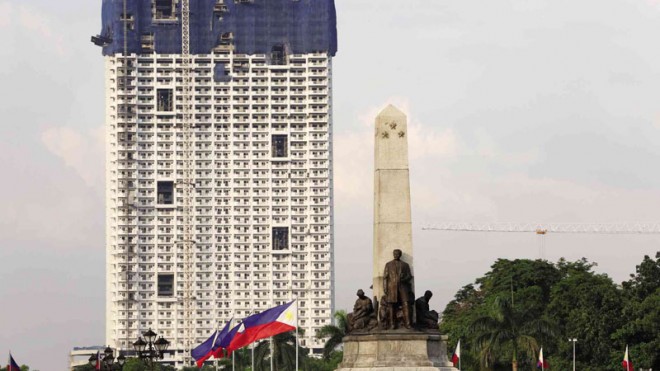
Towering over Rizal Monument at Rizal Park, the controversial 46-story Torre de Manila, described by opponents as an eyesore around the skyline of a heritage site, is almost complete. MARIANNE BERMUDEZ
After coming out swinging against critics of the Torre de Manila condominium, DMCI Homes, the condominium developer, is now demanding over P20 million in damages from the National Commission for Culture and the Arts for a cease and desist order against the condominium’s construction the NCCA issued in January.
DMCI Homes and DMCI Project Developers Inc. are seeking P27 million in damages from the NCCA for the cease and desist order (CDO) it issued in January, which sought to stop the construction of the 49-story building. The petition, filed in the Makati Regional Trial Court, also asked the court to issue a temporary restraining order against the NCCA’s CDO.
Sought for comment, Trixie Angeles, the NCCA’s counsel for all cases related to Torre de Manila, called DMCI’s petition as “ridiculous,” and vowed that the agency would oppose it.
“They want to collect damages from us when in fact, they never stopped despite the CDO we issued. It’s ridiculous and we will definitely oppose it,” she said in a telephone interview.
DMCI filed the petition in February as an appeal to the company’s earlier petition, which the court junked. In the 35-page petition, DMCI claimed that the NCCA did not have the proper authority to stop the company from building the condominium, which sits on private land.
“By issuing the CDO motu propio on the supposed ground that Torre de Manila allegedly ‘destroys or significantly alters the landscape of the Rizal Monument and Rizal Park,’ respondents imposed their own subjective standard of beauty and controlled DMCI-PDI’s use of its property without due process of law and without payment of just compensation to DMCI-PDI,” the petition read.
The firm further said that the CDO deprived it of the beneficial use of its property as it could no longer continue the construction of the condominium, resulting in losses and claims for damages on the company’s part.
“The issuance of the CDO is a wrongful act that caused undue injury to the said entities, both of whom are entitled to the completion of a lawful construction project that complies with all the requirements of the law,” the petition read.
DMCI also reiterated that it has followed all procedures for the project, including applying for permits and exemptions, all of which have been given by the local government and other relevant national government agencies.
Angeles said that DMCI’s petition was flawed both in form and substance. The NCCA has filed its objection to the case, and the court has not issued a ruling, she said.
“This case has already been dismissed by the Makati Regional Trial Court earlier this year, but for some reason, DMCI filed an appeal and the case was revived again. With the NCCA as a quasi-judicial body, the proper course should have been to file this in the Court of Appeals,” Angeles said.
Angeles added that the Supreme Court’s TRO on Torre de Manila’s construction put a question on DMCI’s claim for damages against the NCCA. She noted that the agency has a video in their possession showing work continuing in the condominium site, days after they issued the CDO.
“First of all, they did not stop construction despite the CDO we issued. How can they claim damages on their part when they did not stop construction? Second, the Supreme Court issued a TRO against the construction of the condominium. How can they now prove that we are still liable to pay for damages when the SC has issued a TRO?” Angeles said.
Last week, DMCI issued a statement reiterating their position that the permits issued to them by the Manila city government and other government agencies for the construction of Torre de Manila are valid. They also claimed that the building violated no heritage laws, and did not obstruct the view of the Rizal monument.
The company also released manipulated photos of their “vision” of the Rizal Monument with a backdrop of skyscrapers behind it.
RELATED VIDEOS